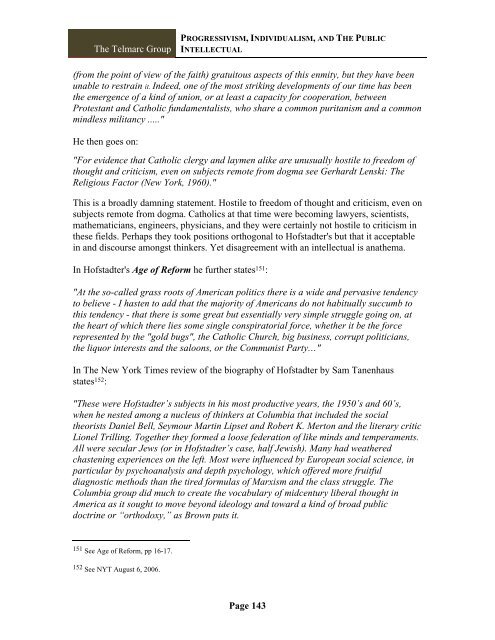progressivism, individualism, and the public ... - Telmarc Group
progressivism, individualism, and the public ... - Telmarc Group
progressivism, individualism, and the public ... - Telmarc Group
Create successful ePaper yourself
Turn your PDF publications into a flip-book with our unique Google optimized e-Paper software.
The <strong>Telmarc</strong> <strong>Group</strong><br />
PROGRESSIVISM, INDIVIDUALISM, AND THE PUBLIC<br />
INTELLECTUAL<br />
(from <strong>the</strong> point of view of <strong>the</strong> faith) gratuitous aspects of this enmity, but <strong>the</strong>y have been<br />
unable to restrain it. Indeed, one of <strong>the</strong> most striking developments of our time has been<br />
<strong>the</strong> emergence of a kind of union, or at least a capacity for cooperation, between<br />
Protestant <strong>and</strong> Catholic fundamentalists, who share a common puritanism <strong>and</strong> a common<br />
mindless militancy ....."<br />
He <strong>the</strong>n goes on:<br />
"For evidence that Catholic clergy <strong>and</strong> laymen alike are unusually hostile to freedom of<br />
thought <strong>and</strong> criticism, even on subjects remote from dogma see Gerhardt Lenski: The<br />
Religious Factor (New York, 1960)."<br />
This is a broadly damning statement. Hostile to freedom of thought <strong>and</strong> criticism, even on<br />
subjects remote from dogma. Catholics at that time were becoming lawyers, scientists,<br />
ma<strong>the</strong>maticians, engineers, physicians, <strong>and</strong> <strong>the</strong>y were certainly not hostile to criticism in<br />
<strong>the</strong>se fields. Perhaps <strong>the</strong>y took positions orthogonal to Hofstadter's but that it acceptable<br />
in <strong>and</strong> discourse amongst thinkers. Yet disagreement with an intellectual is ana<strong>the</strong>ma.<br />
In Hofstadter's Age of Reform he fur<strong>the</strong>r states 151 :<br />
"At <strong>the</strong> so-called grass roots of American politics <strong>the</strong>re is a wide <strong>and</strong> pervasive tendency<br />
to believe - I hasten to add that <strong>the</strong> majority of Americans do not habitually succumb to<br />
this tendency - that <strong>the</strong>re is some great but essentially very simple struggle going on, at<br />
<strong>the</strong> heart of which <strong>the</strong>re lies some single conspiratorial force, whe<strong>the</strong>r it be <strong>the</strong> force<br />
represented by <strong>the</strong> "gold bugs", <strong>the</strong> Catholic Church, big business, corrupt politicians,<br />
<strong>the</strong> liquor interests <strong>and</strong> <strong>the</strong> saloons, or <strong>the</strong> Communist Party…"<br />
In The New York Times review of <strong>the</strong> biography of Hofstadter by Sam Tanenhaus<br />
states 152 :<br />
"These were Hofstadter’s subjects in his most productive years, <strong>the</strong> 1950’s <strong>and</strong> 60’s,<br />
when he nested among a nucleus of thinkers at Columbia that included <strong>the</strong> social<br />
<strong>the</strong>orists Daniel Bell, Seymour Martin Lipset <strong>and</strong> Robert K. Merton <strong>and</strong> <strong>the</strong> literary critic<br />
Lionel Trilling. Toge<strong>the</strong>r <strong>the</strong>y formed a loose federation of like minds <strong>and</strong> temperaments.<br />
All were secular Jews (or in Hofstadter’s case, half Jewish). Many had wea<strong>the</strong>red<br />
chastening experiences on <strong>the</strong> left. Most were influenced by European social science, in<br />
particular by psychoanalysis <strong>and</strong> depth psychology, which offered more fruitful<br />
diagnostic methods than <strong>the</strong> tired formulas of Marxism <strong>and</strong> <strong>the</strong> class struggle. The<br />
Columbia group did much to create <strong>the</strong> vocabulary of midcentury liberal thought in<br />
America as it sought to move beyond ideology <strong>and</strong> toward a kind of broad <strong>public</strong><br />
doctrine or “orthodoxy,” as Brown puts it.<br />
151 See Age of Reform, pp 16-17.<br />
152 See NYT August 6, 2006.<br />
Page 143












